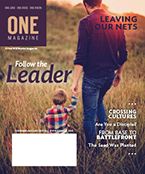
December-January 2016
Follow the Leader
------------------
|






Life in the Valley of the Shadow of Death
By Candice Smith
“Fatal birth defects.” How quickly the excitement of pregnancy changes into shock and grief with those words.
May 2014. Already the parents of a 16-month-old bundle of adorableness, my son and his wife are expecting their second child. The 20-week ultrasound shows that the baby is a girl. It also indicates several irregularities, including some with her heart and brain. A visit to a high-risk obstetrician confirms what are called “fatal defects.” We learn there is a one-in-three chance of miscarriage, possible risks for her mom if she does go full term, and in the unlikely event that she survives birth, she will live only moments. Termination is presented as an option. Firmly believing that life and death belong in God’s hands, her parents tell the doctor that termination is not an option. We begin our journey into the valley.
This is not my first experience with grief. I have lived with rejection and emotional abandonment. I have loved someone who refused to love me back after vowing to God that he would love me as long as we both lived. I have experienced the humiliation of public desertion and watched my dreams die. Being judged (often misjudged) by people I thought cared about me only added salt to the wounds.
I also experienced the grief of losing a best friend. Sadly, she walked away from our 20-year friendship when she walked away from God. Even though it’s been over five years, I still miss her and the bond we had and pray for her restoration.
I experienced another kind of grief when God led me to Welch College. I left home—family, church, house, even country—and, after traveling 1,500 miles, moved into the girls’ dorm. The hardest part was leaving my children: a son, a daughter, a married son and daughter-in-law expecting my first grandchild. Even though they were adults and didn’t “need” me, I felt as though I had ripped my heart in two and left half of it behind.
After nearly three years of recovery, I have finally made it to the place where I have more good days than bad, and I am looking forward to the future. But my hard-won optimism is squashed by the doctors’ prognosis. Instead, dread fills me, and even though I believe God is in control, I am confused and struggle to trust Him. The shadow intensifies with the development of further concerns: terminal cancer diagnosed in family members, personal issues, and my U.S. visa becomes jeopardized.
As with my previous experiences with grief, I hear many less-than-helpful comments. I am advised to be gracious and understanding to “Job’s comforters.” “But I am the one with the broken and bleeding heart!” my mind screams. “Why is it my duty to be the more mature one when someone tramples my suffering?” I can’t help but feel something is wrong with this picture.
The comments are probably offered with the hope of relieving my sorrow (at least I hope so), but the truth is, no words can make it better. I need for others to recognize and acknowledge the pain, not minimize it or spiritualize it. Platitudes and clichés only hurt and insult me.
It really is okay only to say, “I’m sorry” or “I know you’re hurting” or simply to share a hug. That validates my grief and communicates compassion, and frankly, at this stage, is what I need. I am just not ready to hear theories about how God will use this, or what His purpose might be. Worst are the suggestions that termination would have been better. Seriously? Because their time with her is limited, they should deliberately cut it shorter? I often pray for self-control to keep from telling someone off…or worse.
One of my most painful moments comes the evening I overhear my son speaking to the chairman of the cemetery committee, making arrangements for a burial plot, struggling to get the words out. I feel as though my heart is shattering as I stand helpless, unable to do anything for this child of mine. I want so badly to ease his pain, and being powerless leaves me paralyzed. I often feel like I am drowning. A few things, however, give a bit of solace: music; the Psalms; recovery group meetings; and simply doing ordinary, daily things with my family. Sharing my struggles via email with far-away friends also helps me cope, maybe because they are not directly involved.
Weeks go by without possible complications, and we are thankful for God’s grace. Early in the morning on her due date, October 8, Elaina Marie makes her entrance. She weighs 4 pounds, 10 ounces, and is beautiful despite her challenges. As I hold her and look into her face and feel the stirrings of bonding, an alarm goes off inside my head. It warns me, “Protect your heart. The smart and safe thing is not to get attached.” Honestly, it is tempting. I am terrified of losing another part of my heart. Equally frightening to me, however, is where I will end up if I begin shutting down emotionally whenever facing a scary or difficult situation.
Watching my son and daughter-in-law with her inspires me. They continue bravely and unreservedly to love her with their whole hearts, just as they have from the start. So, I pray for courage and choose love, even though it surely leads me deeper into the valley.
The doctors have told us not to expect more than a few minutes with her, if even that. At first, it looks like they were correct. The birth has traumatized her; her color is terrible, and her heart rate drops to 40. They give her to her mama to hold, and within a few minutes her heart rate rises to 60. After half an hour or so, it is up to 120, within the normal range of 120-160 for a newborn. Despite the obvious anomalies, she seems like a typical newborn; as the hours go by, it is tempting to grasp at false hope.
On the second day, I ask the doctor to explain again why she is considered terminal. As I hear the hopelessness of her condition voiced, I feel like something is dying inside me, too. Later that day, her parents bring Elaina home to care for until Jesus takes her to His home and heals her. We have almost five more beautiful, excruciating days with her, trying to squeeze a lifetime of love into fleeting moments, watching her fiercely fight a battle she cannot win, until finally on the morning of October 14, she leaves her earthly parents’ arms to be held forever in the arms of her heavenly Father.
In the weeks that follow, I am tempted with regret. Why didn’t I hold her more? Talk to her more? Sing to her more? I believe this is false guilt, sent from the enemy of my soul to keep me from moving through the grief process, so I reject it. The first time I begin to feel happy, immediately I feel guilty. Again, I reject the guilt. I remind myself of God’s truth and His promises, even though most of the time I don’t feel them. I know Elaina is supremely happy and enjoying perfection in the presence of God and someday I will be with her again, but right now there is a gaping hole where she was supposed to be.
I come across the following principle in an article about grieving during the holidays: gratitude does not cancel out grief, and it is possible to experience both at the same time. It is as though I carry a heavy weight, but gradually God takes it away bit by bit, until one day I realize I have cried less this week, or I enjoyed something without guilt, or I was able to shift the focus off my own pain to reach out to someone else, or I have been able to see something good that God has used the experience to accomplish.
May 2015. One year ago, I was celebrating graduation from Welch College and looking forward to two new grandbabies (my daughter and her husband were also expecting). I was definitely on top of the mountain, but the road took a sudden turn. For 12 months, I have been traveling through a valley, sometimes dark and scary, and despite the occasional bright spot, often terribly painful. Yet, through it all, I know God was there…even when my feelings were all over the place. He has promised He will never leave me.
One night, around two weeks before Elaina’s due date, I was crying out to God about how much it hurt to go through this alone (translation: without a husband), and I asked Him, not for the first time, where to turn for comfort. This time, my loving Father graciously answered me. My comfort will come from the same place it came when my ex-husband left, when I was homesick in Nashville, and when I experienced other grief beyond measure. The God of all comfort, the LORD God Almighty would be enough. And He has been. Again and again, things have fallen into place to supply just what I needed at just the right time, but I know it is He who has actually been providing.
Once again, I am facing a major life change. Once again, all I can do is hold tightly to God’s truth and promises. He can give me beauty for ashes, joy for mourning, and the garment of praise for the spirit of heaviness (Isaiah 61:3). My hope is in Him. He hasn’t brought me this far to abandon me now.
About the Writer: Candice Smith is a 2014 Welch College graduate. After several months of employment at North American Ministries and International Missions, she recently returned to New Brunswick, Canada.
|
|

